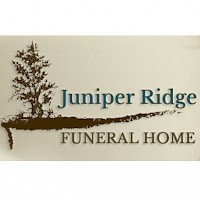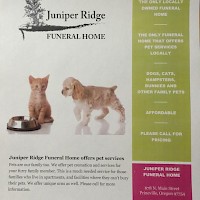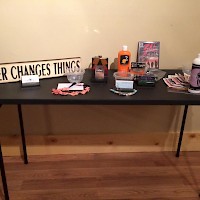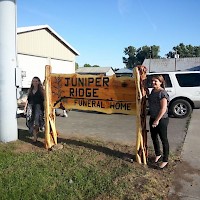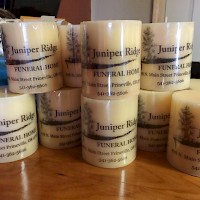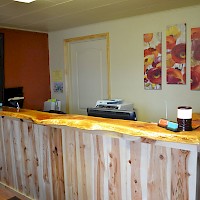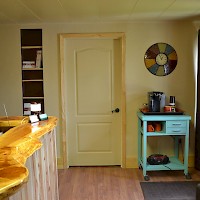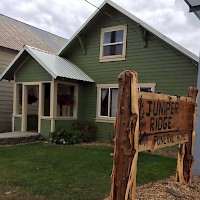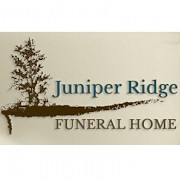
About Juniper Ridge Funeral Home:
Juniper Ridge Funeral Home is a locally owned, affordable funeral home which offers many services ranging from direct cremation to traditional burial. No matter what service is chosen, Juniper Ridge guarantees your loved one and family will be treated with the utmost dignity and compassion. Felicia Sumner and Mandy Cordiner started this business to provide this community with more options. Juniper Ridge is Prineville’s only locally owned funeral home and we are proud of it. Here at Juniper Ridge, we pride ourselves on honesty and faithfulness. We want to work with our families and help them through their hard time.
Felicia Sumner started in the funeral industry when she was 17 years old, which sparked her passion to help families in their time of need. She graduated from Crook County High School in 2006, where she played softball and was on the Crook County Dance team. She then spent the next eight years devoting her life to the funeral industry and starting a career in that field. Felicia has worked throughout the community at various businesses and has done a lot of volunteer work throughout the community. In 2014, she graduated from Mt. Hood Community College. After receiving her degree, her business partner and friend had a dream to open a family funeral home. Felicia enjoys spending time with her family, is an avid hunter, and loves spending time outdoors. She believes in supporting local businesses, sports, clubs, and people. Felicia grew up working very hard for her accomplishments and that carries over to her work. She looks forward to serving you and your family.
Mandy Cordiner graduated from Vale High School in 2002. She then went on to achieve her business degree from the University of Phoenix. Mandy relocated to Prineville where she began work in the funeral industry with Felicia. She saw a great opportunity to help people in need, and decided to branch out. Being from a small town, Mandy understands the importance of supporting a smaller community. Providing more options to encourage keeping business local is crucial for the financial success of a small town. Mandy is an active volunteer and supporter of Relay for Life and also coaches T-Ball in Crook County. Mandy also enjoys the outdoors and is a hunter, wife, and mother of two.
Hours
Monday - Friday
9am to 5pm
Why have a Funeral?
Funerals fill an important role for those mourning the loss of a loved one. By providing surviving family and friends with an atmosphere of care and support in which to share thoughts and feelings about death, funerals are the first step in the healing process. It is the traditional way to recognize the finality of death. Funerals are recognized rituals for the living to show their respect for the dead and to help survivors begin the grieving process.
You can have a full funeral service even for those choosing cremation. Planning a personalized ceremony or service will help begin the healing process. Overcoming the pain is never easy, but a meaningful funeral or tribute will help.
What does a Funeral Director do?
- Pick up the deceased and transport the body to the funeral home (anytime day or night)
- Notify proper authorities, family and/or relatives
- Arrange and prepare death certificates
- Provide certified copies of death certificates for insurance and benefit processing
- Work with the insurance agent, Social Security or Veterans Administration to ensure that necessary paperwork is filed for receipt of benefits
- Prepare and submit obituary to the newspapers of your choice
- Bathe and embalm the deceased body, if necessary
- Prepare the body for viewing including dressing and cosmetizing
- Assist the family with funeral arrangements and purchase of casket, urn, burial vault and cemetery plot
- Schedule the opening and closing of the grave with cemetery personnel, if a burial is to be performed
- Coordinate with clergy if a funeral or memorial service is to be held
- Arrange a police escort and transportation to the funeral and/or cemetery for the family
- Order funeral sprays and other flower arrangements as the family wishes
- Provide Aftercare, or grief assistance, to the bereaved
What do I do when a death occurs?
The funeral home will help coordinate arrangements with the cemetery.
- Bring the following information to complete the State vital statistic requirements:
- Birth Date
- Birthplace
- Father's Name
- Mother's Name
- Social Security Number
- Veteran's Discharge or Claim Number
- Education
- Marital Status
- Contact your clergy. Decide on time and place of funeral or memorial service. This can be done at the funeral home.
- The funeral home will assist you in determining the number of copies of the death certificates you will be needing and can order them for you.
- Make a list of immediate family, close friends and employer or business colleagues. Notify each by phone.
- Decide on appropriate memorial to which gifts may be made (church, hospice, library, charity or school).
- Gather obituary information you want to include such as age, place of birth, cause of death, occupation, college degrees, memberships held, military service , outstanding work, list of survivors in immediate family. Include time and place of services. The funeral home will normally write article and submit to newspapers (newspaper will accept picture and they will be returned intact).
- Arrange for members of family or close friends to take turns answering door or phone, keeping careful record of calls. If Social Security checks are automatic deposit, notify the bank of the death.
When I call, will someone come right away?
If you request immediate assistance, yes. If the family wishes to spend a short time with the deceased to say good-bye, that’s perfectly acceptable. Your funeral director will come when your time is right.
Should I choose Burial or Cremation?
Burial in a casket is the most common method of disposing of remains in the United States, although entombment also occurs. Cremation is increasingly selected because it can be less expensive and allows for the memorial service to be held at a more convenient time in the future when relatives and friends can come together.
A funeral service followed by cremation need not be any different from a funeral service followed by a burial. Usually, cremated remains are placed in urn before being committed to a final resting place. The urn may be buried, placed in an indoor or outdoor mausoleum or columbarium, or interred in a special urn garden that many cemeteries provide for cremated remains. The remains may also be scattered, according to state law.
Why have a public viewing?
Viewing is a part of many cultural and ethnic traditions. Many grief specialists believe that viewing aids the grief process by helping the bereaved recognize the reality of death. Viewing is encouraged for children, as long as the process is explained and the activity is voluntary.
What is the purpose of embalming?
Embalming sanitizes and preserves the body. Embalming makes it possible to lengthen the time between death and the final disposition, allowing family members time to arrange and participate in the type of service most comforting to them.
Does a dead body have to be embalmed, according to law?
The Federal Trade Commission says, "Except in certain special cases, embalming is not required by law. Embalming may be necessary, however, if you select certain funeral arrangements, such as a funeral with viewing. If you do not want embalming, you usually have the right to choose an arrangement that does not require you to pay for it, such as direct cremation or immediate burial."
Why are funerals so expensive?
When compared to other major life events like births and weddings, funerals are not expensive. A wedding costs at least three times as much; but because it is a happy event, wedding costs are rarely criticized. A funeral home is a 24-hour, labor-intensive business, with extensive facilities (viewing rooms, chapels, limousines, hearses, etc.), these expenses must be factored into the cost of a funeral.
Additionally, the cost of a funeral includes not only merchandise, like caskets, but the services of a funeral director in making arrangements; filing appropriate forms; dealing with doctors, ministers, florists, newspapers and others; and seeing to all the necessary details. Funeral directors look upon their profession as a service, but it is also a business. Like any business, funeral homes must make a profit to exist.
Do I have to make different funeral arrangements if I chose cremation?
It really depends entirely on how you wish to commemorate a life. One of the advantages of cremation is that it provides you with increased flexibility when you make your funeral and cemetery arrangements. You might, for example, choose to have a funeral service before the cremation; a memorial service at the time of cremation or after the cremation with the urn present; or a committal service at the final disposition of cremated remains. Funeral or memorial services can be held in a place of worship, a funeral home or in a crematory chapel.
What can be done with the cremated remains?
With cremation, your options are numerous. The cremains can be interred in a cemetery plot, i.e., earth burial, retained by a family member, usually in an urn, scattered on private property, or at a place that was significant to the deceased. (It would always be advisable to check for local regulations regarding scattering in a public place-your funeral director can help you with this.)
Today, there are many different types of memorial options from which to choose. Memorialization is a time-honored tradition that has been practiced for centuries. A memorial serves as a tribute to a life lived and provides a focal point for remembrance, as well as a record for future generations. The type of memorial you choose is a personal decision.
What is memorialization for a cremation?
You might choose ground burial of the urn. If so, you may usually choose either a bronze memorial or monument. Cremation niches in columbariums are also available at many cemeteries. They offer the beauty of a mausoleum setting with the benefits of above ground placement of remains. Many cemeteries also offer scattering gardens. This area of a cemetery offers the peacefulness of a serene garden where family and friends can come and reflect.
Can we scatter the cremated remains?
If you wish to have your ashes scattered somewhere, it is important to discuss your wishes to be scattered ahead of time with the person or persons who will actually have to do the cremation ashes scattering ceremony, as they might want to let your funeral professional assist in the scattering ceremony. Funeral directors can also be very helpful in creating a meaningful and personal ash scattering ceremony that they will customize to fit your families specific desires. The services can be as formal or informal as you like. Scattering services can also be public or private. Again, it is advisable to check for local regulations regarding scattering in a public place-your funeral director can help you with this.
If I am cremated, can I be buried with my spouse even if he or she was in a casket?
Yes — Depending upon the cemetery's policy, you may be able to save a grave space by having the cremains buried on top of the casketed remains of your spouse, or utilize the space provided next to him/her. Many cemeteries allow for multiple cremated remains to be interred in a single grave space.
What do I need to know about income tax when I lose a spouse?
Uncertainty about income tax issues can add to the stress experienced from the death of a spouse. You should meet with your family attorney and/or tax advisor as soon as possible to review your particular tax and estate circumstances. Bring a detailed list of your questions to the meeting. If you do not have an attorney or tax advisor, call the IRS toll-free at 800-829-1040 for answers to specific tax questions.
Is there financial help if I need it?
There are a number of options available, including:
- Determine if the deceased person qualifies for any entitlements. Check with the Social Security Administration, the Department of Veterans Affairs, and with your State Fund. Many people are entitled to get financial assistance with their funeral costs from these agencies if they qualify.
- Review all insurance policies the deceased person has, including life insurance. Some life insurance policies have coverage clauses for funeral related costs.
- Find local charities providing financial help for funeral expenses. Search for non profit organizations and for churches in your area.
- Talk to your funeral director about cremation options - these can be much less expensive depending on your choices.
Grief Support
We offer bereavement services for the families we serve. In addition, we have provided some helpful grief support links below:
Webhealing.com, the first interactive grief website on the internet, offers discussion boards, articles, book suggestions, and advice for men and women working through every aspect of grief. The site’s founder, Tom Golden LCSW, has provided book excerpts and contact information to help those healing from loss.
With nearly 50 internet support groups plus a wide range of online resources, GriefNet provides support for those dealing with all types of loss. Their companion site, kidsaid.com, helps children and their parents deal with grief and loss in an appropriate and safe environment.
Willowgreen offers support and information for those dealing with life transition & aging, illness & caregiving, loss & grief, and hope & spirituality. The site offers advice, products, and inspirational materials.
The American Association of Retired Persons (AARP) website contains a Grief & Loss section with grief-related articles and information.
Growth House is an award-winning website that offers international resources for life-threatening illnesses and end of life care. The site features hypertext topic pages that explain major issues across the spectrum of hospice and home care, palliative care, pain management, grief, death with dignity, and quality improvement. It also offers disease-specific guides, an online bookstore, and even their own radio station.
National Hospice and Palliative Care Organization
The National Hospice and Palliative Care Organization’s website provides a host of information and resources for people facing a life-limiting illness or injury and their caregivers.
Social Security Benefits
Some of the deceased's family members may be able to receive Social Security benefits if the deceased person worked long enough under Social Security to quality for benefits. You should get in touch with Social Security as soon as you can to make sure the family receives all of the benefits to which it may be entitled. Please read the following information carefully to learn what benefits may be available.
A one-time payment of $255 can be paid to the surviving spouse if he or she was living with the deceased; or, if living apart, was receiving certain Social Security benefits on the deceased's record. If there is no surviving spouse, the payment is made to a child who is eligible for benefits on the deceased's record in the month of death.
Certain family members may be eligible to receive monthly benefits, including:
- A widow or widower age 60 or older (age 50 or older if disabled);
- A surviving spouse at any age who is caring for the deceased's child under age 16 or disabled;
- An unmarried child of the deceased who is younger than age 18 (or age 18 or 19 if he or she is a full-time student in an elementary or secondary school); or age 18 or older with a disability that began before age 22;
- Parents, age 62 or older, who were dependent on the deceased for at least half of their support; and
- A surviving divorced spouse, under certain circumstances.
The Social Security website is a valuable resource for information about all of Social Security's programs. There are a number of things you can do online.
In addition to using the Social Security website, you can call them toll-free at 1-800-772-1213. Staff can answer specific questions from 7 a.m. to 7 p.m., Monday through Friday. They can also provide information by automated phone service 24 hours a day. If you are deaf or hard of hearing, you may call the TTY number at 1-800-325-0778.
